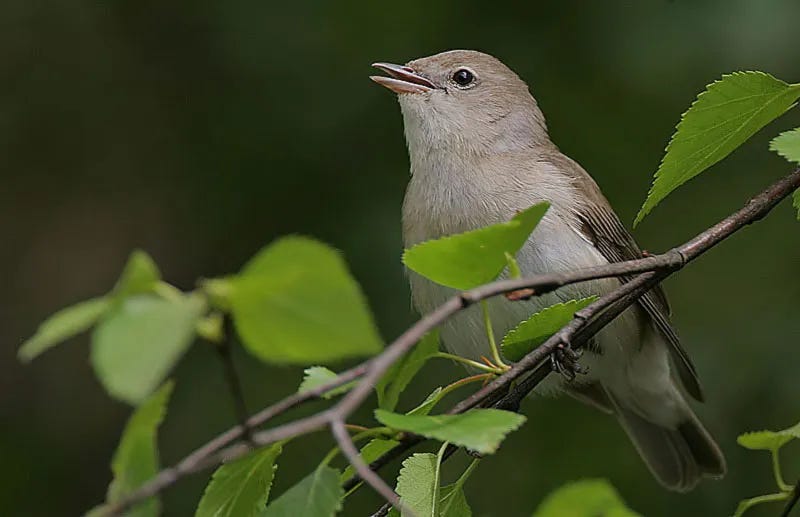By early April, the first blackcaps are singing in many places - just a week or two later than the chiffchaffs, but outperforming them by a country mile, as if making up for lost time.
The song is a varied, rapid, rushing warble, much stronger than a robin or a dunnock.
It’s like they are fit to burst and have to pour it all out as quickly as possible.
Blackcaps are greyish birds, around the size of a sparrow. The male has the black cap, the female has a brown one.
Although blackcaps are far commoner as a summer visitor, many of us will have had our closest sighting of one in the winter, because a few thousand of them choose to spend the colder months in the UK.
Blackcaps have taken a liking to our gardens, and more specifically to the food we put out in them.
They are the only species of warbler we are likely to see hanging off our bird-feeder at Christmas, or at any other time.
But the blackcaps that overwinter with us seem to be a completely separate population to our summer visitors, coming in from elsewhere in northern Europe and heading back East in the spring.
In the summer, blackcaps can be found all over the place, in parks, woodlands and tall hedges.
When the first migrants return in the spring, there’s not much to confuse them with, if you hear them well.
A little later in the season more care is required, because the garden warbler arrives.
Garden warblers are actually less likely to be found in a garden than a blackcap, but both species occur together in some wooded areas, and they really do sound very alike - they’re one of the trickiest pairs to separate on sound.
It’s usually a good idea to be patient and try to see who’s doing the singing. Garden warblers lack a cap, and in fact lack almost any other distinguishing feature, poor things.
In the meantime, if you’re hearing this energetic and varied sound in early April it’s almost certain to be blackcap that’s making it, so it's a good time to get tuned in and to enjoy it.
Sounds suspiciously like: Garden Warbler
Recommended this week:
Merlin Bird ID - the robots are coming and they’re here to confirm our bird calls. This app from the Cornell Lab of Ornithology is an extraordinary leap forward - free, easy to use and very, very good at telling you exactly what’s making noise around you. In real time. The other day it alerted me to some Marsh Harriers displaying high over my head. Sold.
Some Ornithological Chat - the SOC podcast - I’ve been enjoying the Scottish Ornithological Society’s podcast over recent months, and the latest episode is all about ornithological mentoring and learning birdsong. It’s nerdy and full of informative bird call ID tips.
Outrage & Optimism - Momentum vs Perfection - a superb two-part podcast exploring the slippery question - how do we respond to the climate crisis, or anything else that matters?
That’s it. May a blackcap enliven your local foliage this Easter weekend.
~ Charlie
Media credits:
Thanks to Aubrey John Williams and the British Library for the recording of blackcap on Soundcloud.
Blackcap image by Jürgen from Pixabay
Garden warbler image Steve Garvie reproduced under Creative CommonsAttribution-Share Alike 2.0 Generic license.






Great description of Blackcap and the challenges separating it from Garden Warbler. A couple of years ago, I was struggling with a song coming from a thick blackthorn bush. One minute I was convinced it was Blackcap, the next it seemed more like Garden Warbler. Eventually, the Garden Warbler emerged and sang from an exposed branch - only to be chased off by a male Blackcap from deeper inside the bush. At least, I knew why I’d been struggling!